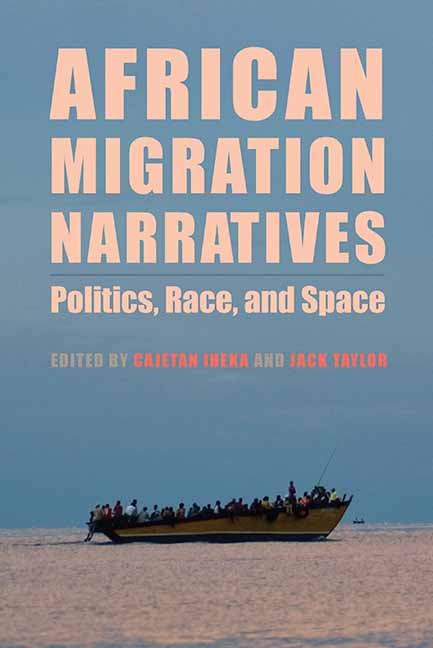Book contents
- Frontmatter
- Contents
- Acknowledgments
- Introduction: The Migration Turn in African Cultural Productions
- Part One African Migration on the Screen: Films of Migration
- 1 Harragas, Global Subjects, and Failed Deterritorializations: The Tragedies of Illegal Mediterranean Crossings in Maghrebi Cinema
- 2 Nollywood Comedies and Visa Lotteries: Welfare States, Borders, and Migration as Random Invitation
- 3 Accented Cinema: The Context of Nollywood
- 4 Migrations and Representations: The Cinema of Griot Dani Kouyaté
- Part Two Forgotten Diasporas: Lusophone and Indian Diasporas
- Part Three Migration against the Grain: Narratives of Return
- Part Four Migration and Difference: Indigeneity, Race, Religion, and Poetry at the Margins
- Bibliography
- Notes on Contributors
- Index
2 - Nollywood Comedies and Visa Lotteries: Welfare States, Borders, and Migration as Random Invitation
from Part One - African Migration on the Screen: Films of Migration
Published online by Cambridge University Press: 26 July 2019
- Frontmatter
- Contents
- Acknowledgments
- Introduction: The Migration Turn in African Cultural Productions
- Part One African Migration on the Screen: Films of Migration
- 1 Harragas, Global Subjects, and Failed Deterritorializations: The Tragedies of Illegal Mediterranean Crossings in Maghrebi Cinema
- 2 Nollywood Comedies and Visa Lotteries: Welfare States, Borders, and Migration as Random Invitation
- 3 Accented Cinema: The Context of Nollywood
- 4 Migrations and Representations: The Cinema of Griot Dani Kouyaté
- Part Two Forgotten Diasporas: Lusophone and Indian Diasporas
- Part Three Migration against the Grain: Narratives of Return
- Part Four Migration and Difference: Indigeneity, Race, Religion, and Poetry at the Margins
- Bibliography
- Notes on Contributors
- Index
Summary
If 2015 saw the largest wave of migration to Europe since the Second World War, 2016 might be defined as the year of migration policy responses. While the mass movement of human beings across the Mediterranean Sea and the southern borders of Europe garnered unprecedented global attention in 2015, many analysts turned their attention to the ensuing financial costs, not so much for the countries migrants left, but for the various Southern European and North Atlantic nations to which they fled. The extent of the financial crisis was particularly evident in the success of a popular referendum (colloquially called “Brexit”), which called for the United Kingdom to leave the European Union in order to gain greater control over its borders. Donald J. Trump echoed the rhetoric of crisis in his proposal to build a wall along the United States’ southern border—and then bill Mexico for its construction—as did UK Prime Minister David Cameron in his proposal to expel immigrants whose income was deemed inadequate for contributing to national prosperity. Gestures like these imply that the economic underdevelopment of the global South, the outbreak of civil war in relatively poor countries, and the rise of international terror organizations like the so-called Islamic State are problems for the world's largest economies to the degree that they strain national budgets, which are meant to serve national citizens. In the rhetoric of crisis, migrants are depicted as liabilities more often than fellow citizens of the world, and they are rarely depicted as potential new laborers, taxpayers, or innovators in the global North. As an article in the Atlantic suggested, the “crisis” was less about migration and more about the status of the modern welfare state and its relationship to the increasingly global movement of labor and the bodies that perform it. Indeed, at the heart of the Brexit decision, and the rise of other nationalist policy positions around the world, is an important question about who is responsible for ensuring that ordinary people have access to work and social security in an increasingly interconnected world. Are welfare states responsible only to their natural-born citizens? What about the external workers and resources upon which the economies of welfare states rely? The 2016 immigration crisis raises a critical and productive question for social and cultural theory: What is the relationship between the concept of the welfare state and the concept of borders?
- Type
- Chapter
- Information
- African Migration NarrativesPolitics, Race, and Space, pp. 39 - 54Publisher: Boydell & BrewerPrint publication year: 2018

